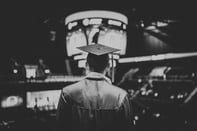Published on
The New Frontier for Learning and Work

This article is excerpted from Stories From the Education Underground: The New Frontier for Learning and Work, authored by Peter Smith.
Millions of Americans are blocked from achieving their economic, social, and civic potential by an education system which fails to capture and recognize their knowledge, skills, and abilities. At the heart of this systemic obstruction of opportunity lies our failure to understand and value personal learning. Using the life stories of personal learners, Stories From the Education Underground: The New Frontier for Learning and Work will unmask this blight and describe solutions which illustrate education’s new frontier and bring innate American talent into public view.
To get at the heart of this problem, we must debunk the myth that college learning is the only learning beyond high school that matters. It is not. There are several paths to learning and career success in addition to the traditional college route. And your personal learning, the learning you do outside of college, matters just as much as college learning in many cases.
So, just what is personal learning? Personal learning is all that other learning that you do, learning that is not planned by schools and colleges. It includes learning:
- From your culture and personal traditions;
- On the job, at home, and in the community;
- With colleagues, supervisors, family, neighbors and friends;
- Directly from life experiences, as well as
- Via the computer, the library, or other data and information sources.
This may surprise you, but more than 80% of what we know comes from learning done outside of school. (Source: Center for Creative Leadership) Personal learning is the driver and source of the vast majority of what we know and are able to do. This book celebrates the power of personal learning, arguing that it must be recognized as legitimate, useful knowledge not only by colleges but also in the workplace. Why? As a matter of simple justice, it is time to bring this massive natural and human resource from the margins to the mainstream of opportunity, education, and work in America.
If you don’t have a college degree, all that learning, the talent that drives it, and the resulting knowledge and capacity gained, is usually ignored and economic opportunity denied. Why?
- Precisely because it isn’t formal and because it has not traditionally qualified for academic credit or an employer credential, personal learning is usually unrewarded at colleges and in the workplace.
- As a result, it goes un-respected by the larger society which fails to see it as an important resource and contributor to a more fair and just social and economic narrative. The equity and opportunity issues here are crystal clear.
“So, what’s the big deal?”, you may be thinking, “that’s why we have colleges, isn’t it?” Well, think of it this way. We all know the phrase, “that’s just the tip of the iceberg”. It refers to the fact that 7/8’s of an iceberg is underwater and out of sight. But still it is there, supporting the tip that we can see. And if you are a ship’s captain, you ignore it at your own peril. Remember the Titanic.
The same is true for your personal learning. The amount and shape of your knowledge is just like that iceberg. The “tip” is comprised of knowledge that has been recognized and defined, usually by college degrees and certificates. The vast majority of your learning, however, is made up of the total package of your cultural background, aspirations and lessons learned from mentors, as well as the knowledge, skills, and abilities you have gleaned from the experience of living. This personal learning lies below the surface of your life, unrecognized and largely invisible to you, your employers, and others.
This knowledge is extremely powerful and valuable. Your talent, self-learned skills and capacity, coupled with your background and lived experience, make you who you are. They comprise the lens through which you see and experience the world, including your employment and income. And they contribute to your aspirations for the future. But when colleges and employers ignore and devalue this powerful personal asset, they are not only hurting you, they are weakening society as well.
The American higher education ladder to opportunity, which has been assembled since World War II, leads to improved job opportunities and a better life for millions. It is a miracle of American democracy and there is much to be proud of. But there is another side to the story. That same ladder to opportunity for some is also inaccessible to many others. And that lack of access contributes to the widening social and economic disparities and inequalities in our society.
Millions of people simply cannot adapt to the traditional collegiate model and its assumptions – financially, culturally, emotionally or physically. In most cases, this is not a function of intelligence or native talent. Life circumstances simply get in the way. Some people have a high school diploma and others have some college, but no certificate or degree. As a result, the only option to employ their talent and acquire knowledge is through personal and experiential learning, including non-collegiate training as they live and work. But when there is no credit given for that learning, it generally does not lead to greater opportunities. Like the kids looking through the window at the candy store, these people are on the outside looking in, so close yet so far from realizing the opportunity they deserve.
Another harsh reality is that college, as it has been structured, has developed a paralyzing grip on our aspirations. On the one hand, it controls our sense of self-identity, self-esteem, and personal focus, as well as our sense of purpose in life. On the other hand, it also structures and controls our understanding of knowledge, competence, and economic and societal status. Furthermore, our current education and employment processes were not designed and organized to recognize the knowledge, skills, and abilities people have gained through personal learning. As a result, they are not converted into personal, academic, and economic value. Educators and employers too often pay attention only to the tip of the learning iceberg – credentials and degrees based on pre-determined curricular priorities at colleges – and ignore the rest. That’s why I have previously referred to the knowledge, skills and abilities gained through personal learning as “hidden credentials”.
The sad fact is that, by separating college learning from personal learning, we weaken both. And as a result, higher education has become, however unintentionally, a significant contributor to the American income and equality gap that has grown so dramatically since the 1960s. It segregates the talent and the personal learning that does not include college as second-class and less important. And it promotes the economic payoff and resulting status of formally gained knowledge as the primary values which college provides. Given this bias, it is the height of irony that employers say that too many recent college graduates are not ready for work in their fields. Or, as one of the people I interviewed said, “While higher education may give you structure, build discipline and hold a whole slew of other benefits, the school of life can very well teach you everything you need to know to be successful.”
On a personal level, imagine living in an environment where your essential being, your lived experience, your knowledge, your talent, and your traditions are treated as less important, second class. Such an environment would require that you construct your own sense of self-worth and self-esteem. This would leave you to make your way through high school and find your first job all without a network of broader societal support and encouragement. That is exactly the task that we expect of more than 30 million adults, our fellow citizens, their friends, and families. And when we do that, we marginalize them, and we shortchange our society by compromising the value which they have to contribute.
As Steve Lohr wrote in the New York Times (12/3/20), “As many as 30 million American workers without four-year college degrees have the skills to realistically move into new jobs that pay on average 70 percent more than their current ones……But the research also shows the challenges that workers face: They currently experience less income mobility than those holding a college degree, which is routinely regarded as a measure of skills. That widely shared assumption…is deeply flawed.”
The good news is that America is beginning to think very differently about issues of fairness involving education, race, economic opportunity, and systemic discrimination. In fact, as Lohr further reported, “…hiring should be based on skills rather than degrees, as a matter of fairness and economic efficiency.” That rethinking is leading to a new appreciation and respect for all the learning we do, including learning from culture, faith, life experience, college, and work. As respect for the value and power of personal learning grows, we are expanding our traditional beliefs to acknowledge that success through the traditional college experience is not the only way to identify knowledge and talent.
Stories From the Education Underground: The New Frontier for Learning and Work shares the life stories of previously marginalized people and the influence of life experience on their knowledge, well-being, and perspectives. The experiences described will show definitively that almost everyone has the innate capacity to learn and that they do so continually. Having said that, we have to remember that these are stories in which people, previously excluded because of their economic standing, race, indigenous origins, lack of post-secondary education and/or other reasons, had to fight their way through to opportunity. The stories show how they struggled mightily to get their talent and capacity recognized. And they show the value of personal networks that ultimately connect them with opportunity; mentors who advise, challenge, and caution them at critical moments; and collegiate as well as non-collegiate programs that meet their needs in real time. These are all supports which expedite the journey to opportunity and which college graduates generally enjoy.
These stories underscore the need for a new, more inclusive eco-system for lifelong learning and work; an eco-system that includes networks, mentoring, and timely programs and information. See Harnessing America’s Wasted Talent (Smith 2010) andLong Life Learning (Weise, 2021) for greater discussion of these issues. As a society, and as educators and employers, we need to respect, recognize, and harness life experience and the knowledge it generates, translating it into opportunity as smoothly and effectively as colleges have done for traditional learners over the years.
This new eco-system will include college as we know it. But it will also include many other qualified options as well:
- Non-traditional and alternative colleges,
- New non-collegiate pathways for learning and work which carry formal recognition,
- Informal access to learning resources and
- The recognition of personal learning from life experience itself.
In the future, people will be able to move from one mode of learning to another, based on their needs and life situation, without penalty. Personal learning and flexible pathways are two keys to a more equitable and just future for all.
Two recent books have raised serious questions about the way colleges work, our use of norms to define quality, and the very notion of merit. In The Merit Myth: How Our Colleges Favor the Rich and Divide America, Carnevale et. al. describe in detail how college degrees are, in and of themselves, discriminatory. The authors’ larger point is that college heavily favors the more well-to-do members of our society. It brands them with implied worth that, while valuable to them, is incomplete and not always entirely accurate. For millions of other people, the downside to this picture is exclusion and systemic discrimination based on race and income.
Todd Rose attacks the issue from another angle in The End of Average: Unlocking Our Potential By Embracing What Makes Us Different. He argues that our penchant for averages and norms has homogenized expectations and measurements of success. This inherent value system has resulted in serious socio-cultural and economic consequences. Put another way, this homogenization is the enemy of individuality and the differences among people. As a result, it hides the uniqueness and value that individuals and cultures embody and that personal learning represents.
Each book questions, in its own way, our definition and understanding of what constitutes valuable knowledge and how to attain it. They also question the definition of educational quality, including the unquestioned value of college as it currently operates. And the “sameness” which that homogeneity creates, including its treatment of most personal learning, is inherently exclusionary.
Ask yourself these questions.
- Are the norms of a “dominant culture”, for example, America’s white culture, the only valuable norms?
- Are people who graduate from college more worthy or better than people who do not?
- Is there only one way to “do” college in terms of organization, content, cost, structure, timing, values, and goals?
- Are there other ways to recognize talent, capacity, and knowledge?
- Is diversity within and across our society a source of strength to be developed or a weakness to be treated and reduced?
America’s learning and work landscape must incorporate personal learning, and the talent and capacity which drives it, as an explicit and inherently valuable component of a person’s knowledge. This expanded definition of knowledge is far more inclusive than simply knowing a great deal about a particular subject, be it accounting, computer technology, nuclear physics, or Hegelian philosophy. It includes two additional dimensions.
The first is comprised of cross-cutting intellectual capacities such as problem-solving, critical thinking, and analytical skills. They describe what you are able to do with the knowledge you have acquired. The second includes emotional intelligences and how they contribute to critical abilities such as communication, effective teamwork, promoting diversity, and leadership. Emotional intelligence determines how you will employ the knowledge you have gained. When understood through the lens of all three dimensions, this enhanced definition of knowledge will provide a warm home for millions of people whose talent and capacity have previously been excluded.
Stories From the Educational Underground: The New Frontier for Learning and Work will focus on personal learning as a common denominator among people. As they reflect on these stories, readers will sense the power of their own personal learning and better understand its value. Importantly, they will also be exposed to the personal, societal, and economic costs that accrue when personal learning is marginalized and ignored.
We are leaving millions of people and a great deal of talent and capacity on the far side of a massive opportunity gap which hurts individuals. When such learning has not been captured as part of your educational or employment records, or recognized as having societal value, your knowledge and your credentials often remain hidden, and your future is compromised.
But, as bad as it is for individuals, the gap is also bad for society. Contrary to the myth of America as the land of opportunity, if you are born poor, are a person of color or a member of an indigenous community, too often your chances for educational success, economic opportunity and security are far more limited than if you are not. So, closing this gap is also a critical social justice issue. When it is analyzed along economic and racial lines, the systemic disparities and the gross inequalities are crystal clear, and the divisions created by privilege appear. Put more bluntly, if we are going to end systemic discrimination in education, work, and the larger society, we must encourage, respect, and reward talent and knowledge in all of its forms and regardless of how it was gained. And recognizing the importance and the power of personal learning lies at the heart of this conversation.
It is time we closed the gap, recognizing and celebrating a diverse American societal and cultural DNA which includes cultural background, life experience, knowledge, and learning. There is plenty of data to chronicle the gap and make this case. But data is not flesh and blood. It is time we heard from America’s previously excluded personal learners – good people, hard-working people, smart people – as they describe their struggles to achieve opportunity and get value for their hidden credentials. They will describe their lives, their work, and the creation of their knowledge and talent. And they will share the benefits they have accumulated, along with the losses they suffered and the opportunities they were denied along the way.
I will share the life stories of people who started life on the far side of that opportunity gap. But we must remember that they are success stories, the exception to the rule. They have overcome the obstacles to opportunity through persistence, patience, and hard work. And, in a few cases, they simply bypassed those obstacles like a hurdler going over a hurdle. All in all, they are heroes and survivors of a process that was stacked against them.
Bringing the power of their learning and its value in their lives – their hidden credentials – into broad daylight will point the way to a happier, fairer, and more economically just society. And seeing how to realize the personal as well as academic and economic value for hidden credentials will put power where it belongs, in the hands of every person.
Consider the impact of the COVID-19 pandemic. We experienced vividly the vulnerability of workers trapped by work circumstances which were often determined by life circumstances, systemic discrimination, and/or a lack of formal education. They were trapped between a rock (economic necessity) and a hard place (the pandemic). I want to break that trap, shining a bright light on personal learning through life experience as a powerful source of talent. Talent which, when recognized and respected, can create greater economic opportunity, greater economic security, increased self-esteem, and a more just and healthy society.
Stories From the Education Underground: The New Frontier for Learning and Work has three purposes. The first is for each of us to recognize, value, and reflect on the personal learning we do and its impact on us. Understanding your personal learning gives you more control over your life, no matter who you are. The second is to illustrate the human and societal costs of the way we currently treat many learners and to argue for a new way of thinking about them. And the third is to describe programs and pathways which will create the new ecosystem we need and provide the needed support to personal learners throughout life.
As I have experienced these things professionally, thought about them, and discussed them with others, I have come to the following understandings.
- The traditional college experience usually confirms mainstream cultural and intellectual expectations. And success in college often includes acceptance of those expectations, consciously or unconsciously.
- Life experience – our culture and background as well as lived experience – is our one “true” teacher, bringing the deepest learning we do and forming the foundation of our understanding of the world. As important as it is, however, this learning lies beyond traditional definitions of education and is often de-valued.
- When life experience learning is marginalized, it devalues talent and can deepen existing divisions of culture, race, and economics.
- When life experience is respected, recognized and augmented with focused learning, whether college or other, the whole is greater than the sum of its parts, and more diverse populations are recognized.
- Currently, there is a lot of talent and capacity that regularly goes unrecognized and therefore untapped.
We all bring cultural perspectives, talent, knowledge, skills and abilities gained outside of traditional higher education to the table. Consider the following nuggets of American folklore.
Live and Learn.
The School of Hard Knocks.
Older, But Wiser.
We have all heard these sayings. They affirm an understanding that life has important lessons and that you will become more knowledgeable and accomplished as the years pass. In each saying, the message is similar. You can learn from the experience of living. There are strong and useful connections between effort, learning, and success. If you are resourceful, work hard, and learn on your feet, opportunity will come knocking. This folklore is part of the American promise: that everyone will have a seat at the table of opportunity if they work hard and play by the rules. And it suggests that all will be treated with equal respect.
Unfortunately, our folklore is far from the reality that many Americans endure. These stories from the “learning underground” will describe what it is like to struggle and fight simply to have a chance for that promise of increased opportunity, recognition, respect, and reward. And, in reporting the successes that some truly heroic people have had in overcoming or bypassing these obstacles, it will advocate for making the recognition of personal learning part of the pathway to opportunity and success in the new eco-system of learning and work. These learners must bring their unique talents from the margin to society’s mainstream and get credit where credit is due.
Here’s what you will find in this book. We think of life as a linear journey. In fact, however, for many people life is dominated by uncontrolled happenstance which is framed by a lack of resources. That lack leads to a revolving door of jobs gained and lost, unsuccessful attempts at college, and personal circumstances that have made a linear journey impossible. For others, people with ADHD, other disabilities, or those who needed “hands-on” learning, the way schools are organized was an obstacle to success. And running throughout these stories is the consistent sub-text of discrimination by race and economic status. While the people in this book ultimately succeeded, they were fighting a status quo which was stacked against them the whole way.
While each of the life stories that follow are unique, they generally share common defining elements including hard and uncertain circumstances early in life dictated by income, race, and other insecurities. In case after case, the lives into which these people were born dictated the realities they faced during their early years. In virtually every case, they needed to fight to change the arc of their life to even have a chance at succeeding.
Two other common elements among the stories are turning points and transitions. Turning points are those moments when you realize you have come to a crossroads in your life and things need to change. They are triggering events that propel you on a new course. And life transitions are what comes next; when learners change course and seek a new future. In most cases, transitions drive further learning and greater understanding.
The stories will also include the reflections of personal learners as they think back on their learning journey and transitions and understand how their perspectives on life have changed over time. What did those events mean to them? How did the recognition of their knowledge affect them? And how did their personal understanding of their life journey deepen and evolve at various stages of their lives.
Look for all these elements in each of the life stories which follow as well as in your own life story:
- The beginning of life’s journey,
- The impact of work and life experience on learning,
- Turning points and transitions, and
- Reflection on the larger meaning they extract from their lived experience and personal learning.
And then begin thinking seriously about how you, as an educator, an employer, a colleague or a friend, can begin to bring this powerful learning out of the underground.
This article is excerpted from Stories From the Education Underground: The New Frontier for Learning and Work, authored by Peter Smith.
Author Perspective: Educator



